THE EPIGENETICS REVOLUTION: HACKING YOUR GENES FOR PEAK PERFORMANCE
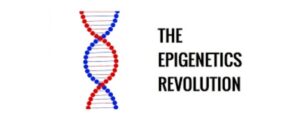
INTRODUCTION
Epigenetics is the study of how environmental factors can influence the expression of genes without changing the underlying DNA sequence. Epigenetic modifications can be passed down from one generation to the next and can play a significant role in the development of various diseases and disorders.
Epigenetics has a significant impact on peak performance as well. For instance, exercise can lead to epigenetic modifications that enhance physical performance. In one study, researchers found that endurance exercise led to changes in DNA methylation patterns in genes related to muscle development and function, resulting in improved athletic performance.
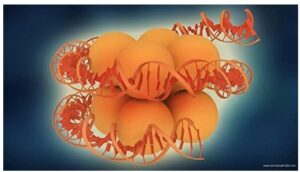
Similarly, a healthy diet has been linked to positive epigenetic modifications as well. For example, a study showed that individuals who followed a Mediterranean diet had lower levels of DNA methylation in genes related to inflammation, leading to a reduced risk of chronic diseases such as heart disease and diabetes.
Stress can also have a significant impact on epigenetic modifications, which can ultimately impact peak performance. Chronic stress has been shown to lead to changes in DNA methylation patterns in genes related to the stress response and inflammation, leading to an increased risk of mental health issues such as anxiety and depression.
In my life too Epigenetics played a significant role and lifestyle interventions such as exercise, a healthy diet, and stress management techniques have led to positive epigenetic modifications which ultimately enhanced all aspects of my life, especially during my police training days.
Before I joined the Police Academy in 1991, I was in a bit of a rut. I had just gotten married the previous year, but I had started to put on weight and develop a bit of a pot belly. My diet was not the healthiest, and I wasn’t getting much exercise. I was feeling pretty down and lacked confidence in myself.
However, all of that changed when I joined the Academy. Suddenly, I was surrounded by brilliant and hardworking trainees who were all dedicated to health and fitness. I was forced to undergo 4-5 hours of outdoor training every day, which was a big change from my previous sedentary lifestyle. But I was determined to keep up with my peers, and as a result, I started eating much healthier in the police mess.
The competition with my fellow cadets pushed me to my limits both physically and mentally, but I discovered a newfound sense of discipline and resilience that I never knew I had. I was able to shed the excess weight and regain my physical fitness. It was amazing how much better I felt, both physically and mentally.
Being in such an environment of hardworking and driven individuals also helped me to adopt healthy sleeping habits, ensuring that I was well-rested and ready for the challenges of each day. I found myself retiring early at night and waking up early in the morning to run and practice a parade.
As a result of all these changes, my confidence and energy levels skyrocketed. I started to look smart and handsome with a short crew cut, and I was a hundred times more fit than I had been during my marriage. My productivity went through the roof, and I always felt like I could conquer the world. Despite the grind at the Academy, I was always in an upbeat mood.
In conclusion, changing my environment had a huge impact on my life. By surrounding myself with like- minded and driven individuals at the Police Academy, I was able to adopt healthy habits, build resilience, and achieve my goals. I went from feeling down and lethargic to feeling energized and confident, and it was all thanks to the positive environment that surrounded me.

One of the most inspiring movies about transformation through diet and exercise is “Rocky” directed by John G. Avildsen. This iconic film tells the story of Rocky Balboa, a struggling boxer who gets a shot at the world heavyweight championship. Rocky is a small-time fighter who works as an enforcer for a loan shark. He lives in a rundown apartment and survives on a diet of cheap food and beer.
However, everything changes when Rocky is given the chance to fight Apollo Creed, the reigning world champion. To prepare for the fight, Rocky completely transforms his lifestyle. He starts eating healthy food, abstains from alcohol, and starts training intensely. He runs up the steps of the Philadelphia Museum of Art, lifts weights, and practices punching.
Through his intense training and healthy lifestyle, Rocky becomes a completely different person. He sheds the extra weight, gains incredible strength, and develops impressive stamina. His transformation is not just physical, but also mental. He gains self-confidence, determination, and a sense of purpose.
When the day of the big fight arrives, Rocky is in the best shape of his life. His hard work pays off as he goes the distance with Apollo Creed, taking the fight to the final bell. Although he loses the fight, Rocky has become a winner in life. He gains the respect of his community, earns the love of his girlfriend, and becomes a role model for people all over the world.

The success of “Rocky” inspired a whole generation of people to get into shape and start exercising. The movie shows that with hard work, dedication, and a healthy lifestyle, anyone can achieve their dreams. Rocky’s transformation is a testament to the power of environment, discipline, and positive change. Similarly, Once a struggling student with a difficult childhood, Frank Shorter’s life changed when he discovered his passion for running. His dedication to training led to epigenetic modifications that improved his athletic performance, and he eventually became a world-class marathon runner and gold medallist. Along the way, he also found that the discipline and focus required for running translated into other areas of his life, leading to a transformation that went beyond physical fitness. Despite the challenges he faced, Shorter’s epigenetic modifications allowed him to rewrite his story and become the best version of himself.
But how do epigenetics impact an individual’s performance? Epigenetic modifications, including DNA methylation, histone modifications, and non-coding RNA molecules, influence gene expression patterns and alter cellular function. For instance, research has suggested that DNA methylation patterns can be altered by exercise, leading to changes in gene expression that promote performance improvements. Similarly, the effect of diet on epigenetic modifications has also been studied, and it has been found that certain nutrients can affect DNA methylation patterns and gene expression related to performance.
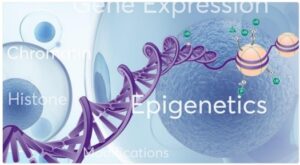
Stress can also have a significant impact on epigenetic modifications and performance. Chronic stress can lead to epigenetic changes that negatively affect cognitive function and mental health, while short-term stress can trigger beneficial epigenetic modifications that enhance performance.
The potential for epigenetic interventions to enhance performance is an area of active research. For instance, some studies have investigated the use of dietary supplements that target specific epigenetic modifications to improve performance. Additionally, research has explored the potential use of gene therapy to alter epigenetic patterns and enhance performance.
Overall, understanding the role of epigenetics in performance and exploring interventions that target these mechanisms could provide new opportunities for enhancing human performance. Epigenetic modifications have been linked to a variety of health conditions, including cancer, heart disease, diabetes, and neurological disorders. They can also impact cognitive function, mood, and behavior.
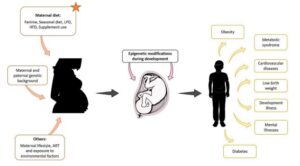
For example, studies have shown that certain lifestyle interventions, such as exercise and a healthy diet, can lead to changes in DNA methylation patterns, which can ultimately improve health outcomes. In one study, individuals who followed a Mediterranean diet had decreased DNA methylation of genes associated with inflammation, which is a risk factor for heart disease.
Additionally, stress has been shown to lead to epigenetic modifications that can impact mental health. Chronic stress can cause changes in DNA methylation patterns in genes related to the stress response and inflammation, leading to an increased risk of depression and anxiety.
Therefore, it is important to adopt healthy lifestyle habits to promote positive epigenetic modifications. This can include regular exercise, a healthy diet, stress management techniques, and adequate sleep. These interventions can lead to improved physical and mental health, and ultimately, enhanced performance in all aspects of life.
IMPORTANT EPIGENETIC INTERVENTIONS THAT CAN MAXIMIZE PERFORMANCE
Several epigenetic interventions can potentially lead to peak performance. Incorporating the following interventions could have a massive impact on one’s life.
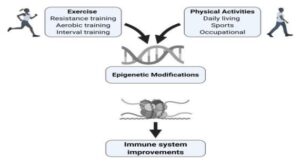
Exercise:
Regular exercise has been shown to have positive effects on epigenetic modifications, particularly DNA methylation and histone modifications. Aim for at least 150 minutes of moderate-intensity exercise or 75 minutes of vigorous-intensity exercise per week. You can incorporate exercise into your daily routine by walking or cycling to work, taking the stairs instead of the elevator, or joining a fitness class.
Nutrition:
A balanced and healthy diet can also influence epigenetic modifications. For example, a diet rich in fruits, vegetables, and whole grains can increase DNA methylation and histone acetylation. On the other hand, a diet high in processed and sugary foods can lead to epigenetic changes associated with chronic diseases. Aim for a balanced diet that includes plenty of fruits, vegetables, whole grains, lean proteins, and healthy fats.
Stress Reduction:
Chronic stress has been shown to affect epigenetic modifications and lead to negative health outcomes. Incorporating stress-reducing practices such as meditation, yoga, or deep breathing exercises can potentially lead to positive epigenetic changes. Try to set aside some time every day for stress-reducing activities.
Sleep:
Adequate sleep is important for overall health and has been shown to affect epigenetic modifications. Aim for 7-8 hours of sleep per night and establish a regular sleep routine.
This can include going to bed and waking up at the same time every day, avoiding caffeine and electronics before bed, and creating a relaxing sleep environment.
Mindfulness:
Mindfulness practices such as meditation and deep breathing exercises have been shown to have positive effects on epigenetic modifications, particularly telomere length. Incorporate mindfulness practices into your daily routine by setting aside time for meditation or practicing deep breathing exercises during breaks.
Incorporating these epigenetic interventions into your daily routine can potentially lead to positive epigenetic changes and enhance performance. It’s important to remember that epigenetic modifications are influenced by a combination of environmental and genetic factors, so these interventions may have varying effects on different individuals. It’s also important to consult with a healthcare professional before making any significant changes to your lifestyle or diet.
EPIGENETICS OF EXERCISE
The latest research suggests that exercise can induce changes in gene expression and DNA methylation patterns related to peak performance. For instance, studies have found that acute exercise can lead to increased expression of genes involved in energy metabolism and muscle contraction, while long-term exercise training can result in changes in gene expression related to mitochondrial biogenesis and muscle fiber type.

Furthermore, exercise has been shown to alter DNA methylation patterns in various tissues, including skeletal muscle, adipose tissue, and blood cells. These changes can affect gene expression and cellular function, potentially contributing to improved performance.
Recent research has also investigated the effects of different types of exercise on epigenetic modifications and performance. For instance, one study found that high-intensity interval training (HIIT) led to greater changes in DNA methylation patterns and gene expression related to mitochondrial function and muscle growth compared to moderate-intensity continuous training (MICT).
Another study examined the effects of resistance exercise on DNA methylation patterns and gene expression in skeletal muscle, finding that this type of exercise induced changes in gene expression related to muscle hypertrophy and metabolism.
Overall, these findings suggest that exercise-induced changes in gene expression and DNA methylation patterns may contribute to improved performance, and that different types of exercise may have unique effects on these epigenetic mechanisms.
EPIGENETICS OF DIET AND SLEEP
Recent research has demonstrated that diet and sleep can also influence gene expression and DNA methylation patterns related to peak performance.
Regarding diet, studies have shown that specific nutrients can impact DNA methylation patterns and gene expression related to performance. For instance, research has indicated that omega-3 fatty acids found in fish can affect DNA methylation patterns and gene expression in the brain, potentially improving cognitive function and mood.
Similarly, research has demonstrated that the consumption of dietary polyphenols, such as those found in fruits and vegetables, can affect DNA methylation patterns and gene expression related to inflammation and oxidative stress, potentially improving athletic performance and recovery.

Regarding sleep, research has found that sleep deprivation can lead to changes in DNA methylation patterns and gene expression that negatively impact cognitive function and mood. For example, one study found that sleep deprivation was associated with altered DNA methylation patterns in genes related to stress response and inflammation.
On the other hand, getting adequate sleep has been linked to positive changes in gene expression related to athletic performance and recovery. For instance, one study found that sleep extension improved basketball performance and was associated with changes in gene expression related to inflammation and immune function.
Overall, these findings suggest that diet and sleep can impact gene expression and DNA methylation patterns related to peak performance and may represent important areas for intervention to enhance performance.
EPIGENETICS OF STRESS
An environment of stress can have a significant impact on epigenetic modifications, which can lead to changes in gene expression and potentially contribute to the development of various diseases. Here are a few notable examples:
Childhood Trauma and DNA Methylation:
Childhood trauma is known to increase the risk of developing depression, anxiety, and other mental health disorders. Researchers have found that exposure to childhood trauma can cause changes in DNA methylation patterns, which can affect the expression of genes involved in stress response and emotional regulation. For example, a study published in the Journal of Child Psychology and Psychiatry found that childhood trauma was associated with increased methylation of the gene NR3C1, which encodes the glucocorticoid receptor. This can lead to a decreased ability to regulate the stress response, contributing to the development of mood disorders.
Social Stress and Histone Modifications:
Social stress can also have a significant impact on epigenetic modifications. For example, a study published in the Journal of Neuroscience found that chronic social defeat stress in mice caused histone modifications in the prefrontal cortex, a brain region involved in emotional regulation and decision- making. These histone modifications were associated with decreased expression of genes involved in synaptic plasticity and increased expression of genes involved in inflammation and oxidative stress.

Work-Related Stress and Telomere Length:
Work-related stress has been shown to have an impact on telomere length, which is a marker of cellular aging. Telomeres are protective caps on the ends of chromosomes that shorten with age, and shortened telomeres have been linked to various diseases, including cancer and cardiovascular disease. A study published in PLOS ONE found that work-related stress was associated with shorter telomere length in nurses. The researchers suggested that work-related stress may lead to oxidative stress and inflammation, which can contribute to telomere shortening.
These examples demonstrate that an environment of stress can have a significant impact on epigenetic modifications, which can contribute to the development of various diseases. Understanding the mechanisms by which stress affects epigenetic modifications can help develop new interventions to prevent and treat stress-related disorders.
EPIGENETICS OF ENVIRONMENT
Epigenetics doesn’t change the genetic code, it changes how that’s read. Perfectly normal genes can result in cancer or death. Vice-versa, in the right environment, mutant genes won’t be expressed. Genes are equivalent to blueprints; epigenetics is the contractor.
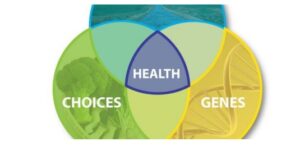
Bruce Lipton’s quote highlights the importance of epigenetics in gene expression and how the environment plays a crucial role in determining the outcome of genetic expression. Our genes provide the blueprint for our body’s functions, but they can be affected by environmental factors such as diet, exercise, stress, and toxins.
Epigenetic modifications, such as DNA methylation and histone acetylation, affect how genes are read and expressed. These modifications can turn genes on or off, influencing various aspects of our biology, including our physical and mental health, and performance.
In some cases, normal genes can result in cancer or death if epigenetic modifications turn them on or off inappropriately. For example, the BRCA1 gene, which normally helps to prevent breast cancer, can become inactive due to methylation, increasing the risk of developing breast cancer.
On the other hand, in the right environment, mutant genes may not be expressed. For example, individuals with a genetic predisposition to obesity may not develop the condition if they are in an environment that promotes healthy eating and exercise habits.
Therefore, the environment plays a critical role in determining how our genes are expressed, and we have the power to influence our gene expression by creating a favorable environment. This highlights the importance of making healthy lifestyle choices, such as eating a balanced diet, engaging in regular physical activity, managing stress, and avoiding toxins, to optimize our genetic expression and achieve peak performance.
EPIGENETICS OF SOCIAL ENVIRONMENT
A man is an average of 5 persons he spends most of his time with. Explains the extent of the impact of the environment on a man and his success or failure. The idea that “a man is an average of 5 persons he spends most of his time with” suggests that the people we surround ourselves with can significantly influence our beliefs, values, behaviors, and ultimately our success or failure. This quote highlights the crucial role that our environment plays in shaping who we are as individuals.
Think about it: if you spend most of your time with people who are negative, lazy, and unmotivated, it’s likely that you will start to adopt some of these qualities. Conversely, if you surround yourself with people who are positive, ambitious, and driven, you’re more likely to embody these traits as well.
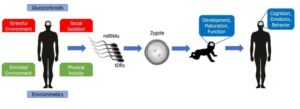
Epigenetics, which is the study of how environmental factors can influence gene expression, provides further support for this idea. Research has shown that environmental factors such as diet, exercise, stress, and social support can all have an impact on our epigenetic modifications and ultimately affect our performance.
For example, if you spend most of your time with people who prioritize healthy eating and regular exercise, you’re more likely to adopt these habits as well. This can lead to epigenetic modifications such as DNA methylation and histone acetylation, which can positively impact your physical and mental health, cognitive function, and overall performance.
On the other hand, if you surround yourself with people who engage in unhealthy behaviors such as smoking or excessive drinking, it’s likely that you’ll be exposed to similar environmental factors and may experience negative epigenetic modifications as a result.
In conclusion, the quote “a man is an average of 5 persons he spends most of his time with” highlights the importance of our environment in shaping who we are as individuals and ultimately determining our success or failure. By being mindful of the people we surround ourselves with and making conscious choices about our environment, we can positively influence our epigenetics and enhance our performance. Changing the environment one finds oneself in can drastically change a person’s life.
One famous individual whose life changed drastically after being transplanted in a new environment is J.K. Rowling. Rowling had a tumultuous early life, marked by financial struggles and the tragic loss of her mother. She had always been a creative person, but it wasn’t until she moved to Portugal that her life really changed.

Rowling moved to Portugal in 1990 to teach English as a foreign language. It was there that she met her future husband, and it was also there that she started writing the first Harry Potter book. The new environment was a fresh start for Rowling, away from the financial struggles and emotional turmoil of her previous life.
In Portugal, Rowling was able to focus on her writing and was inspired by the stunning landscapes and rich cultural history of the country. She wrote every spare moment she had, often in cafes and on napkins during her breaks from teaching. It was in Portugal that she also began to refine her storytelling skills, taking inspiration from the tales and legends she heard from her students and from the country’s folklore.
But Rowling’s life really changed when she moved back to the UK in 1993. She continued to write the Harry Potter series, but it was the new environment and the new people she met that really catapulted her to success. She joined a writing group and received feedback and encouragement from other writers, and she was also able to network with publishers and literary agents.
Rowling’s life was transformed by the success of the Harry Potter series. She went from being a struggling single mother to one of the wealthiest women in the world. But it all started with a change in environment, a move to Portugal that allowed her to escape the struggles of her past and focus on her passion ,for writing.
Another famous individual whose life changed dramatically after being transplanted in a new environment is Steve Jobs. Jobs had a difficult upbringing, marked by family struggles and a lack of direction. But when he dropped out of college and moved to California in the 1970s, he found himself in an environment that would change his life forever.

California in the 1970s was a hotbed of innovation and creativity, particularly in the technology industry. Jobs quickly fell in love with the culture and the people, and he began to experiment with computer technology, building and selling computers out of his garage with his friend Steve Wozniak.
It was in California that Jobs found his calling as an entrepreneur and innovator. He was inspired by the counterculture movement of the time, which emphasized experimentation and creativity, and he was also surrounded by a community of like-minded individuals who were passionate about technology and pushing boundaries.
Jobs went on to co-found Apple Computer and develop some of the most revolutionary products in the technology industry, including the iPod, iPhone, and iPad. His vision and leadership transformed Apple from a small startup to one of the most successful companies in history.
It’s clear that Jobs’ life was transformed by his move to California. The environment he found himself in allowed him to explore his passions and push the boundaries of what was possible in the technology industry. Without that move, it’s hard to say whether Apple would have ever existed, and whether Jobs would have become the icon he is today.
Both J.K. Rowling and Steve Jobs experienced dramatic transformations in their lives after being transplanted in new environments. For Rowling, it was the move to Portugal that allowed her to focus on her writing and refine her storytelling skills. For Jobs, it was the move to California that allowed him to explore his passion for technology and innovation. Both individuals found themselves in environments that allowed them to reach their full potential, and the world is a better place for it.
HOW EPIGENETIC INTERVENTIONS MAXIMIZE PERFORMANCE
Epigenetic interventions have the potential to enhance performance by modifying gene expression and improving physiological responses. Here are a few examples:
Exercise and DNA Methylation: Exercise has been shown to modify DNA methylation patterns in skeletal muscle, which can lead to changes in gene expression and improve muscle function. For example, a study published in the Journal of Applied Physiology found that exercise training increased methylation of the PGC-1α gene, which encodes a transcriptional coactivator involved in energy metabolism and mitochondrial biogenesis. This increased methylation was associated with increased expression of PGC-1α and improved muscle oxidative capacity.
Nutrition and Histone Modifications: Nutrition can also affect epigenetic modifications, particularly histone modifications. For example, a study published in the Journal of Nutritional Biochemistry found that supplementation with resveratrol, a polyphenol found in grapes and red wine, increased histone acetylation in human white blood cells. Histone acetylation is associated with increased gene expression and improved immune function.
Mindfulness Meditation and Telomere Length: Mindfulness meditation has been shown to have a positive impact on telomere length, which is a marker of cellular aging. A study published in the journal Brain, Behavior, and Immunity found that mindfulness meditation increased telomerase activity, an enzyme that adds DNA sequence repeats to telomeres, in immune cells. This increased telomerase activity was associated with increased telomere length and improved immune function.
These examples demonstrate that epigenetic interventions can enhance performance by modifying gene expression and improving physiological responses. Understanding the mechanisms by which epigenetic modifications are altered by lifestyle interventions can help develop new strategies to enhance performance and prevent disease.
SOME EPIGENETIC HACKS THAT CAN OPTIMIZE YOUR PERFORMANCE
Here are ten epigenetic interventions that can help you optimize your performance if you incorporate them into your daily routine.

Exercise – Exercise is one of the most potent epigenetic interventions, and regular physical activity has been shown to enhance cognitive function, reduce stress, and improve overall well-being. Incorporating exercise into your daily routine can be as simple as taking a brisk walk or doing a few minutes of yoga each day.
Sleep – Getting enough sleep is essential for optimal performance, as it allows our bodies to repair and regenerate. Sleep deprivation has been linked to a host of negative health outcomes, including impaired cognitive function, reduced immunity, and increased stress. To optimize your sleep, try to establish a regular sleep schedule and create a sleep-friendly environment that is cool, dark, and quiet.
Meditation – Meditation has been shown to have numerous health benefits, including reducing stress, improving mood, and enhancing cognitive function. Incorporating a few minutes of meditation into your daily routine can help you stay focused and calm throughout the day.
Nutrition – The food we eat can influence our epigenetics, and a healthy diet can enhance cognitive function, reduce inflammation, and promote overall well-being. Incorporating nutrient-dense foods such as fruits, vegetables, and lean proteins into your diet can help optimize your performance.
Fasting – Fasting has been shown to have numerous health benefits, including improving cognitive function, reducing inflammation, and promoting longevity. Incorporating intermittent fasting into your routine can be as simple as skipping breakfast a few times per week.
Cold exposure – Exposure to cold temperatures has been shown to enhance cognitive function, reduce inflammation, and improve overall well-being. Incorporating cold exposure into your routine can be as simple as taking a cold shower or swimming in cold water.
Mind-body practices – Mind-body practices such as yoga, Tai Chi, and Qi Gong have been shown to have numerous health benefits, including reducing stress, improving mood, and enhancing cognitive function. Incorporating a few minutes of mind-body practice into your daily routine can help you stay focused and calm throughout the day.
Social connection – Social connection has been shown to have numerous health benefits, including reducing stress, improving mood, and enhancing cognitive function. Incorporating social connection into your daily routine can be as simple as spending time with friends or family, or volunteering in your community.
Environmental exposure – Exposure to natural environments such as forests, beaches, and mountains has been shown to have numerous health benefits, including reducing stress, improving mood, and enhancing cognitive function. Incorporating regular exposure to natural environments into your routine can help you stay focused and calm throughout the day.
Mindset – Finally, our mindset can significantly influence our epigenetics, and cultivating a growth mindset can help us optimize our performance. Incorporating practices such as gratitude journaling, positive self-talk, and visualization can help you cultivate a growth mindset and stay focused on your goals.
Polyphenol-rich foods: Polyphenols, found in foods such as berries, tea, and dark chocolate, have been shown to promote epigenetic modifications that improve brain function and reduce inflammation.
Omega-3 fatty acids: Omega-3 fatty acids, found in fatty fish, have been shown to promote epigenetic modifications that improve brain function and reduce inflammation.
Probiotics: Probiotics have been shown to promote epigenetic modifications that improve gut health and reduce inflammation.
Prebiotics: Prebiotics, found in foods such as onions, garlic, and bananas, have been shown to promote epigenetic modifications that improve gut health.
Phytochemicals: Phytochemicals, found in foods such as broccoli, kale, and tomatoes, have been shown to promote epigenetic modifications that improve brain function and reduce inflammation.
Resveratrol: Resveratrol, found in red wine and grapes, has been shown to promote epigenetic modifications that improve brain function and reduce inflammation.
Vitamin D: Vitamin D has been shown to promote epigenetic modifications that improve bone health, immune function, and brain function.
Curcumin: Curcumin, found in turmeric, has been shown to promote epigenetic modifications that improve brain function and reduce inflammation.
Incorporating these epigenetic interventions into your daily routine can help you optimize your performance, enhance your cognitive and physical abilities, and promote overall well-being. Whether you choose to start with a few simple changes or dive in with a comprehensive lifestyle overhaul, taking control of your epigenetics can be a powerful tool for achieving your goals and living your best life. It’s important to note that more research is needed to fully understand the effects of these interventions on epigenetic modifications and peak performance.
CONCLUSION
Epigenetic interventions are processes that can alter the expression of genes without actually changing the DNA sequence itself. These interventions have gained increasing attention in recent years for their potential to optimize human performance and enhance health outcomes.
The reason epigenetic interventions have an important role in achieving peak performance is that they can modulate gene expression in response to environmental cues, allowing the body to adapt and respond to stressors more effectively. This ability to adapt and respond to stressors is crucial for achieving peak performance, as it enables the body to withstand and recover from physical and mental demands.
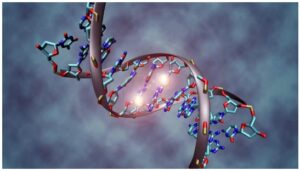
To take full advantage of the potential of epigenetic interventions for peak performance, individuals can adopt a holistic approach that encompasses all of the aforementioned interventions. This may involve regular exercise, a healthy diet, stress management techniques, and adequate sleep. It is also important to note that epigenetic interventions are not a one-size-fits-all solution, and different individuals may respond differently to different interventions based on their unique genetic makeup and environmental factors.
In summary, epigenetic interventions have an important role in achieving peak performance by modulating gene expression in response to environmental cues. To take full advantage of their potential, individuals can adopt a holistic approach that encompasses a range of interventions such as exercise, nutrition, stress management, and sleep. By doing so, individuals can optimize their genetic potential and enhance their physical and mental performance.
 Dr K. Jayanth Murali is a retired IPS officer and a Life Coach. He is the author of four books, including the best-selling 42 Mondays. He is passionate about painting, farming, and long-distance running . He has run several marathons and has two entries in the Asian book of Records in full and half marathon categories. He lives with his family in Chennai, India. When he is not running, he is either writing or chilling with a book.
Dr K. Jayanth Murali is a retired IPS officer and a Life Coach. He is the author of four books, including the best-selling 42 Mondays. He is passionate about painting, farming, and long-distance running . He has run several marathons and has two entries in the Asian book of Records in full and half marathon categories. He lives with his family in Chennai, India. When he is not running, he is either writing or chilling with a book.

Mar 18, 2023 at 4:10 PM /
It is actually a great and helpful piece of info. I am glad that you just shared this helpful info with us. Please keep us up to date like this. Thanks for sharing.